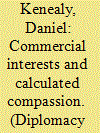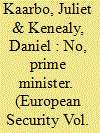|
|
|
Sort Order |
|
|
|
Items / Page
|
|
|
|
|
|
|
| Srl | Item |
| 1 |
ID:
149247


|
|
|
|
|
| Summary/Abstract |
On 2 November 2014 George Osborne stood in the impressive great council chamber of Manchester town hall and, flanked by the ten leaders of Greater Manchester's local authorities, announced a devolution deal for the city-region. Greater Manchester would receive a significant package of powers over transport, housing, planning, skills, business support and welfare in exchange for creating new governance structures, including a directly elected mayor for the city-region. This article explores the background to the Devo Manc deal, arguing that it is the product of both a long history of local government collaboration in Greater Manchester and George Osborne's desire for a sweeping restructure of English governance. It traces how the key decisions were taken quickly and by a small number of key officials. The article also identifies some flaws in Devo Manc and considers whether it is an appropriate model for other city-regions in the UK.
|
|
|
|
|
|
|
|
|
|
|
|
|
|
|
|
| 2 |
ID:
115099


|
|
|
|
|
| Publication |
2012.
|
| Summary/Abstract |
The release of the only man convicted of the bombing of Pan-Am Flight 103 over Lockerbie, Scotland in December 1988 is the most significant diplomatic decision taken by the Scottish government. The decision constituted a two-level process: the British government's behaviour was characterised by commercial interests; and the Scottish governments by calculated compassion. Britain's policy was steered by its national interest in securing Libya's rehabilitation into international society and ensuring that British businesses could benefit. Scotland's paradiplomacy shifted from a strategy of avoidance to one using the release to further the idea of an independent Scotland. Presenting the release in such a way was to bolster the idea of Scotland as a distinct entity with its own set of values, laws, and customs and possessing an ability to operate autonomously on the international stage.
|
|
|
|
|
|
|
|
|
|
|
|
|
|
|
|
| 3 |
ID:
143592


|
|
|
|
|
| Summary/Abstract |
On 29 August 2013, the UK House of Commons inflicted the first defeat on a Prime Minister over a matter of war and peace since 1782. Recalled to debate and vote on UK intervention in Syria, the Commons humbled the government and crucially impacted the development of UK foreign policy. This article places that vote, and the developments leading to it, in the context of the role of parliaments in security policy and explores the relationships between parliamentary influence, leadership, intra-party and intra-coalition politics, and public opinion. From an in-depth analysis of leaders’ statements and parliamentary debate, we find a combination of intra-party politics and party leadership were most significant. An additional factor – the role of historical precedent – was also important. Our analysis explores the fluidity and interconnectedness of the various factors for parliamentary influence in foreign policy and offers directions for future theoretical development and empirical research.
|
|
|
|
|
|
|
|
|
|
|
|
|
|
|
|
| 4 |
ID:
119987


|
|
|
|
|
| Publication |
2013.
|
| Summary/Abstract |
The past 15 years have seen an explosion of interest in the scholarship of E.H. Carr. As a founding figure of the realist approach to International Relations, as a philosopher of history and as a historian of the Soviet Union, Carr made important contributions. His work on the post-war political organisation of Europe has been somewhat neglected. While not going so far as to argue for the introduction of 'another E.H. Carr' - Carr the European integration theorist - this article argues that Carr's specific brand of realism has much to say not only about the establishment, but also about the subsequent development, of the European Economic Community. Carr's realism was, we argue, capable of understanding change in international society. This understanding was grounded in an appreciation of the role of power and morality in international politics and stands in sharp contrast to the emphasis on the structural factors that are prized by neorealists. While Carr's vision of post-war Europe has not materialised in its entirety, it captures some of the crucial fault lines that animate the European project. Building a bridge between European integration studies and Carr's realism will provide a fruitful avenue through which classical realism can once again begin to engage with developments in international politics.
|
|
|
|
|
|
|
|
|
|
|
|
|
|
|
|
|
|
|
|
|